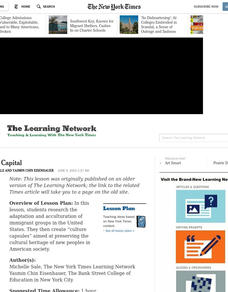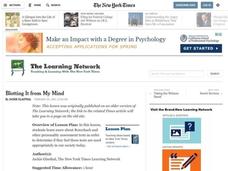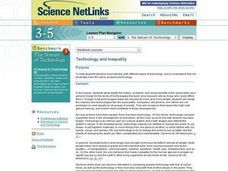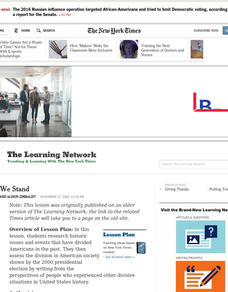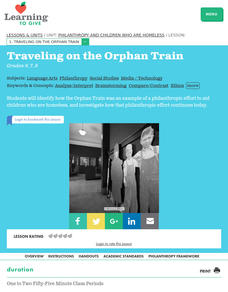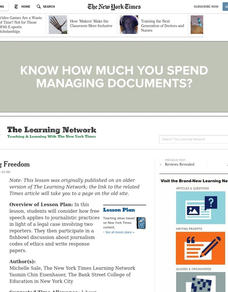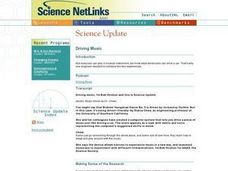Curated OER
Cultural Capital
Students research the adaptation and acculturation of immigrant groups in the United States. They create culture capsules aimed at preserving the cultural heritage of new peoples in American society.
Curated OER
Technically Speaking
Young scholars research how various forms of technology have changed during different time periods and the ways in which technology impacts society. They propose designs for galleries within a technology museum.
Curated OER
Heroes of Harlem
Students explore the artists of the Harlem Renaissance. Their research culminates in a Harlem Renaissance Fair celebrating the movement's cultural and artistic contributions to society.
Curated OER
Psychology: Blotting It from My Mind
Students research Rorschach and other personality assessment tests in order to determine if they feel these tests are used appropriately in our society today.
Curated OER
Is Monopoly the Microsoft Board's Game?
Students first participate in an in-depth discussion about capitalism, monopolies, trusts, mergers, and the Sherman Antitrust Act. They work in groups to investigate past examples of corporations tried for antitrust act violations.
Curated OER
Mom, Where Do TV's Come From?
Students explore the history of television using the lifetime achievements of Milton Berle as a springboard for studying social and technological advances in American entertainment. They, in groups, examine the role of television through...
Curated OER
How Media Shapes Perception
Students explain the impact that the media may have in shaping their intellectual and emotional responses to current events. They examine broadcast and Web-based news sites to find subtexts through the use of language, audio, and visual...
Curated OER
Technology and Inequality
Students study briefly the history, evolution, and social benefits of the automobile. After using the automobile as a case study, students choose another technology, research, and analyze it in small groups and report.
Curated OER
The Sporting Life
Students read and discuss "When the Games Began: Olympic Archaeology," examining the significance of the first Olympic Games in Greece. They research and reenact scenes from these Games and reflect on the Games' original importance.
Curated OER
Divided We Stand
Students research historic issues and events that have divided Americans in the past. They assess the division in American society shown by the 2000 presidential election by writing from the perspectives of people who have seen other...
Curated OER
Philanthropy And Children Who Are Homeless Lesson 1: Traveling on the Orphan Train
Students research how the Orphan Train was an example of philanthropy that was aimed at aiding homeless children. They determine how this philanthropic effort continues now by researching contemporary relief agencies. They participate in...
Curated OER
Press-ing Freedom
Students consider how free speech applies to journalistic practices in light of a legal case involving two reporters. They participate in a fishbowl discussion about journalism codes of ethics and write response papers.
Curated OER
You Can't Stop The Pop
Young scholars reflect on the popular culture of their own country and explore the "Korean Wave" of popular culture in East Asia. They research the popular cultures of various countries around the world and present their findings in an...
Curated OER
Robot Gears
High schoolers build simple gear trains and record data to discover how to compute gear ratios. They investigate the definition of torque and how torque can be increased or decreased in a gear train.
Curated OER
The Hippies vs. Authority
Students, in groups, explore the dynamics between hippies and authority figures and create a T-chart outlining the concerns and arguments of both sides.
Curated OER
A Call to Jihad
Students view a video clip about Islam in the Middle East. They discuss quotes by Hussein calling for a jihad and what jihad means. They examine Hussein's leadership qualities as well.
Curated OER
The Art of Communication
Students research the Morse Code created by Samuel F. B. Morse in 1838. They participate in decoding messages on a printable student activity sheet. They write their own Morse Code message and have a peer try and decode it.
Curated OER
Binary and Communication Systems
Learners participate in an activity that introduces them to the concept of binary coding as a language. They decode messages using special boards that has its own code for different letters. They create new codes by rearranging wires...
Curated OER
Conflict, Tragedy and the Power of Art
Students investigate some the ways art has responded to conflict throughout history. Through teacher lecture and demonstration, students witness the historical background of a piece of artwork and how it reflects the conflict it...
Curated OER
Discoveries of Titanic Proportions
Young scholars analyze various statements on the moon. After reading an article, they discuss the findings about a new moon around Saturn. In groups, they re-create a press conference in which the new findings were released to the...
Curated OER
It's Up for Debate
In this lesson, students investigate the different platforms of each of the Presidential hopefuls for the 2000 election. Small groups each carefully research the platforms of an assigned candidate and then create a political pamphlet...
Curated OER
The Renaissance
Students encounter having been chosen to join a group of renowned historians who have been offered an unprecedented opportunity. They travel back in time to the Renaissance time period. Students research one aspect of that time period....
Curated OER
World Continents
Students identify the continents of the world. In groups, students create a three-dimensional clay representation of their assigned continent. Using KidPix software, they draw and color their continent. Students research their continent...
Curated OER
Driving Music
Students experience both playing a musical instrument and driving a car. The two experiences tied together by one engineer. The score appears as a road, with twists and turns representing the composer's suggested shifts in mood. This...


